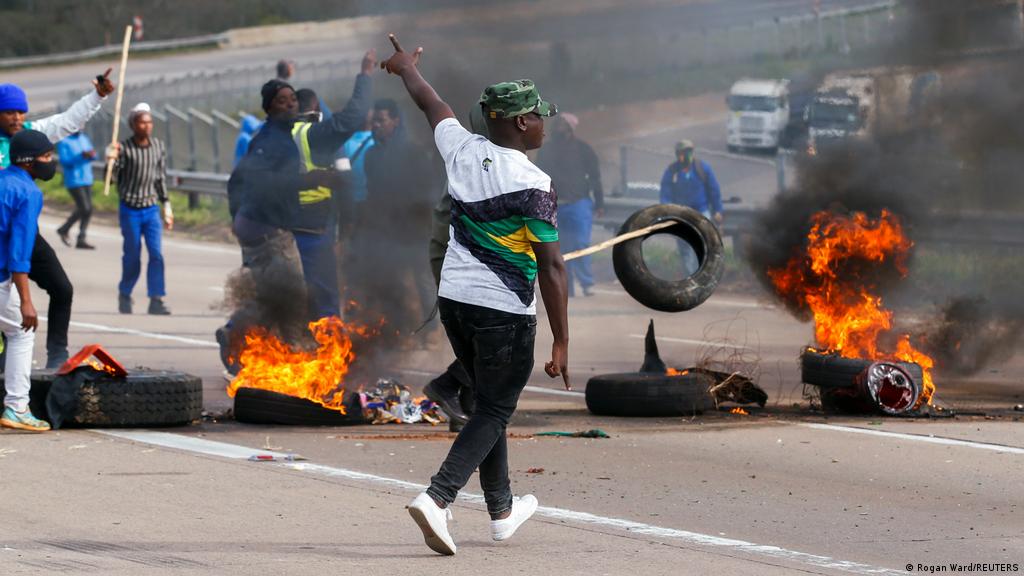A new wave of violence has erupted in South Africa with the government deploying military troops to restore calm and order. At least 6 people have died.
The disturbances have intensified as former President Jacob Zuma began a legal challenge to his 15-month prison term sentence in the country’s top court.
Images of burning buildings and items looted from shopping malls were widely shared on social media on Monday, with the violence largely taking place in Zuma’s home province of KwaZulu-Natal, and a few skirmishes reported in Gauteng, home to the country’s biggest city, Johannesburg.
In a late evening address on Monday, South African President Cyril Ramaphosa condemned the violence and said 489 suspects had been arrested.
“What we are witnessing now are opportunistic acts of criminality, with groups of people instigating chaos merely as a cover for looting and theft,” he said.
“We will not hesitate to arrest and prosecute those who perpetrate these actions and will ensure that they face the full might of our law.”
A statement from the military said “pre-deployment processes had started” following a request for assistance from a government intelligence body, but a Reuters cameraman in Pietermaritzburg saw armed soldiers already in the streets.
Why is the violence taking place?
South Africa’s Constitutional Court sentenced Jacob Zuma for 15 months in prison for refusing to appear before a commission investigation sweeping corruption allegations during his time as president from 2009 to 2018. He and his supporters blasted the decision saying he was treated unfairly and sentencing him to prison without trial was unconstitutional.
Zuma initially refused to turn himself to prison as the court had ordered, but after lengthy negotiations with the police, he eventually gave in at the last moment and reported to the authorities last Wednesday. His supporters, who had earlier vowed never to allow his arrest, then called for a shutdown of KwaZulu-Natal.
One of Zuma’s daugthers, Duduzile Zuma-Sambudla, posted images of the destruction on Twitter with messages of praise.
Impact of the violence
The rand (South Africa’s local currency) has slumped to its weakest level against the dollar in more than two months. It exchanged at 14.4681 per dollar by close of business.
“It is difficult to tell which is the greater emergency in South Africa right now: the riots, which have resulted in significant property damage, looting and affected the movements of goods along an important trade corridor, or the continued spread of Covid-19,” Siobhan Redford, an analyst at Rand Merchant Bank in Johannesburg, said in a client note. “It will be important to see the government take action.”
Even as the violence continues, the World Bank has released its South Africa Economic Update which paints a gloomy picture on the country’s financial state. It has therefore suggested that the government bolster hiring by temporarily extending tax incentives, suspending rules that increase labor costs and introducing measures to support entrepreneurship and self-employment.
The Washington-based lender added, “While other reforms including tackling electricity supply constraints remain pivotal, time-bound emergency measures to support poorer workers and create jobs are needed as the economy recovers from the devastation wrought by the coronavirus pandemic.”
South Africa’s unemployment rate stood at a record 32.6% in the first quarter of 2021, and the rate has remained above 20% since the end of apartheid in 1994 even as the economy expanded by 5% or more.
The World Bank says it took Africa’s most industrialized country six years to add 1.4 million jobs to its pre-pandemic economy. South Africa has also recorded the continent’s highest rate of COVID-19 infections (2.2 million) and deaths (64,509).

